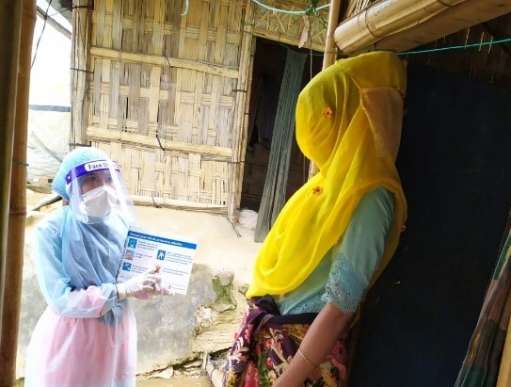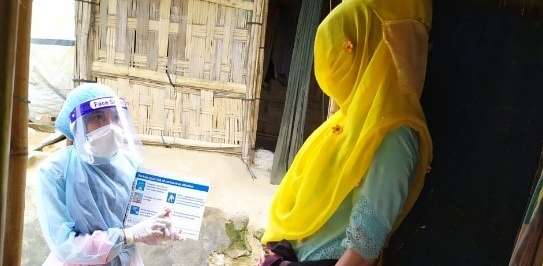Almost a year on from when coronavirus was officially declared a global pandemic by the World Health Organisation, the virus continues to wreak havoc around the world. So far there have been 116,879,152 confirmed cases of coronavirus globally and 2,594,064 deaths. Yet sadly, for many people in some of the world’s poorest countries the end is nowhere near in sight. While richer countries see the roll-out of coronavirus vaccines more and more, it is estimated that four in five people in the poorest countries will not be vaccinated this year.
In Bangladesh, no vaccines have reached any of the 850,000 Rohingya refugees living in sprawling refugee camps in Cox’s Bazar.
For many, and particularly those living in crowded refugee camps, knowing how the virus spreads and how best to prevent catching it is one of the few remaining lifelines as they and other poorer countries await the widespread rollout of vaccines.
On International Women’s day, we take a look at how one young woman who works for Christian Aid’s local partner is leading the charge against coronavirus misinformation in the camps, helping ensure Rohingya refugees have the information they need to keep safe from the virus.
Image credits and information

The Rohingya have faced systematic discrimination and violence in Myanmar for decades.
Many fled across the border to Bangladesh during previous waves of violence but the exodus in August 2017 was by far the largest and most sudden to date, with more than half a million Rohingya fleeing violence in Rakhine State in less than a month.
One such refugee who fled Myanmar during 2017 was Jubaida. Now 18-years-old, Jubaida arrived in Cox’s Bazar with her seven siblings after losing their parents.
Pictured, a Community Health Worker from Christian Aid’s local partner goes door-to-door in the Rohingya refugee camps of Cox Bazar’ to raise awareness of keeping safe from coronavirus.
In early 2018, Jubaida found a cash for work opportunity as a community health worker with a local organisation in the camp to help support her family financially. A year later, her experience allowed her to make the switch to Christian Aid’s local partner organisation Dhaka Ahsania Mission (DAM) where she has continued her work as a community health worker.
As a community health worker, Jubaida makes door to door visits in the camp and provides general health advice, family planning advice and more to Rohingya refugees.
However, following the first confirmed cases of coronavirus detected inside the camps in May and with 406 confirmed cases of the virus amongst refugees in the camps, Jubaida’s role took on added importance. With gatherings of people and group sessions more difficult because of the pandemic, her door to door visits became crucial to providing people with accurate information about the virus to help them keep safe.
I teach them about how coronavirus spreads from person to person and what health conditions make people more vulnerable to this deadly virus. I tell everyone to avoid gathering in groups, to wash their hands a lot, not to leave their home unless absolutely necessary and to wear a mask if they do go outside. I especially advise elderly refugees to stay indoors as much as possible as they are more vulnerable to the virus.'
As Jubaida explains, delivering reliable information about coronavirus is of pressing importance as the living conditions of the refugees put them at heightened risk of catching the virus.
“Parents want to keep their children safe from this deadly virus but overcrowding in the camp makes the refugees vulnerable,” Jubaida says.
The Rohingya people live in flimsy shelters with up to ten or more people in one room and they have to share toilets. There is also not a lot of space when they collect food which makes social distancing difficult.
Jubaida fears that should a widespread outbreak of coronavirus occur in the camps, the cramped conditions, in which physical distancing is almost impossible, will help the virus to rapidly spread amongst the population in a short amount of time and that this combined with a lack of specialized medical equipment will likely lead many to die, most notably the camps older population.
But these conditions are not the only ones putting the camp’s refugees at heightened risk of catching coronavirus. There is also a lack of facilities for carrying out coronavirus testing in the camp and it is difficult for medical personnel to refer suspected patients to referral centres which are situated very far away from the camp.
“As there isn’t enough medical care in the camp, many elderly people may not be able to survive an outbreak. I tell people to seek treatment so they don’t infect their families,” Jubaida says.
Misinformation about coronavirus and stigma attached to people suspected of having it is also prevalent in the camp and something which community health workers are actively working to counter.
“There is a fear that people will get a bad reaction from their family and the wider community if they get diagnosed with coronavirus, which may lead them to hide symptoms and not seek treatment,” Jubaida explains.
However, because Jubaida herself is a Rohingya refugee, she has been able to gain the trust of her community which has proven key to their acceptance of her advice about coronavirus.
They treat me as their daughter, their sister, someone close to them.
Christian Aid has been leading a consortium of NGO’s since 2018 that provides essential healthcare services to the Rohingya community in two camps, through its local partner DAM.
From August 2019 to December 2020, DAM’s community health workers have conducted over 186,000 medical consultations reaching over 62,000 Rohingya refugees and people from the local Cox’s Bazar community. Over 20,000 door-to-door visits have also been carried out reaching more than 100,000 Rohingya refugees with vital healthcare advice. In addition, over 72,000 Rohingya refugees were reached with coronavirus awareness raising through door to door visits since March 2020. Christian Aid has supported DAM in providing specialist training to its community healthcare workers.



